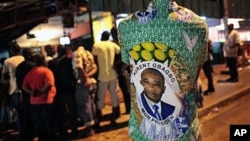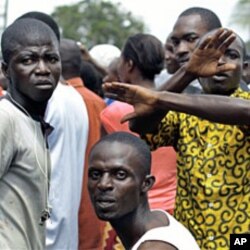In Ivory Coast, a spokesman says President Laurent Gbagbo is confident of victory as he prepares for a runoff election later this month against former Prime Minister Alassane Ouattara. The election is the first presidential ballot in the West African nation in 10 years, when Mr. Gbagbo became head of state.
Neither President Gbagbo nor former prime minister Ouattara won a majority in Sunday's much-awaited presidential vote, so they will face each other in a second round run-off ballot at the end of this month.
Both campaigns are taking a break until Ivory Coast's constitutional court validates provisional results that show Mr. Gbagbo leading with about 38 percent of the vote, to just over 32 percent for Mr. Ouattara. Former president Henri Konan Bedie finished third with 25 percent of the votes, and his party is calling for a recount.
In Abidjan Friday, Mr. Gbagbo's campaign spokesman, Affi N'Guessan, congratulated Ivorians on a peaceful, democratic poll and predicted Mr. Gbagbo would win the runoff, currently scheduled for November 28.
He says, in the first round Mr. Gbabgo dominated the southern part of the country, regardless of ethnicity. According to the spokesman, Mr. Gbagbo won more than 45 percent of the votes in Abidjan, the West African nation's commercial capital, and also finished first in the western part of the country. In the east, N'Guessan says, the president won more ballots than Bedie.
The campaign for both remaining candidates now focuses on winning over the 25 ercent share of the electorate that backeed Bedie. The former president and Ouattara are part of the same opposition coalition, and they had pledged mutual support in the event of a runoff. Still, President Gbagbo may be able to attract Bedie voters who are uncomfortable with Ouattara; the former prime minister was prevented from running for president in the past because of questions about his nationality.
Spokesman Affi N'Guessan says elections and politics are not simple arithmetic, and that one should not automatically conclude the opposition will win the second round because the sum of Bedie and Ouattara's first-round votes was larger than Gbagbo's total. More important, the spokesman says, is the second-choice candidate for the voters who originally supported Bedie.
N'Guessan says Mr. Gbagbo's party is investigating suspicions of electoral irregularities in the northern part of Ivory Coast, where Ouattara dominated the first-round of the election. The presidential spokesman says there large increases in the numbers of registered voters in that region.
The presidential election is meant to reunite Ivory Coast, which has suffered through years of instability. A failed coup against Mr. Gbagbo in 2002 led to civil war that split the country between a rebel-held north and a government-held south.














